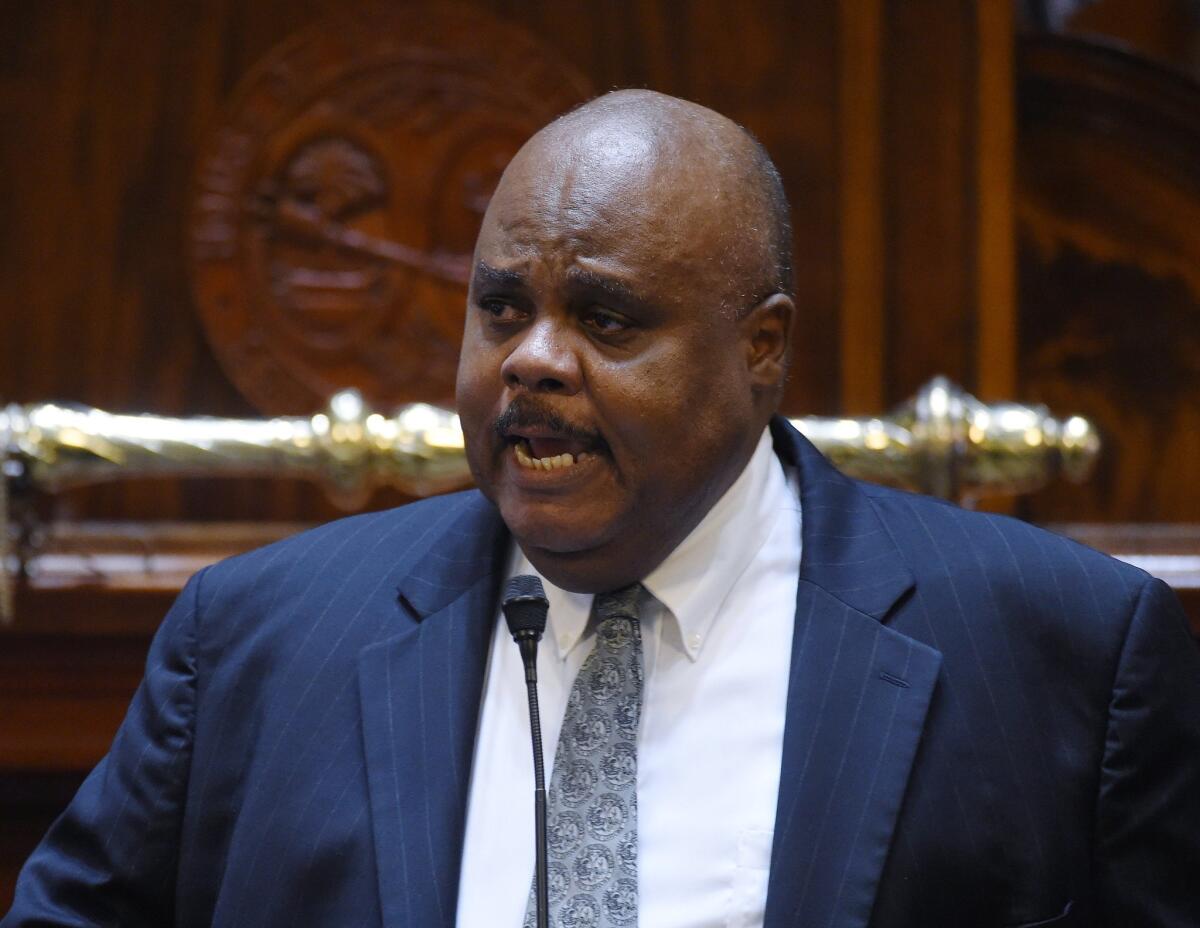My family was ‘brought here in chains,’ S.C. lawmaker says during Confederate flag debate

South Carolina Rep. Joe Neal (D-Richland) speaks during a special session of the Legislature at the South Carolina Statehouse during a debate about the removal of the Confederate flag from the Statehouse grounds.
- Share via
During a historic debate, South Carolina lawmakers in the House of Representatives argued whether to remove the Confederate flag from the Statehouse grounds.
Some white Republican lawmakers who were opposed to the measure spent much of the day telling stories about their ancestors who fought for the Confederacy, calling the rebel banner not a symbol of hate but part of their heritage.
The plight of South Carolina’s slaves was rarely mentioned until late in the debate, when Rep. Joseph H. Neal, a black Democrat from Richland, rose to speak.
Here are excerpts from his moving speech before the House overwhelmingly voted to take down the flag:
“I sat and listened all day long with great interest and empathy for what was said. ... When we talk about this situation with that flag in front of the Statehouse, I would point out to you that in all the conversations that we heard today, they all focused on one side of this situation. It was all about the Confederate dead. It was not about others who suffered and died too.
“I even heard conversations about African Americans who fought for the Confederacy, and I did a little research, and what I turned up was this: Did you know that in South Carolina, there were no blacks who fought for the Confederacy? Because the Confederate Congress did not approve black soldiers fighting for the Confederacy until a month before Appomattox. And if you look at your timeline, you’ll find that Sherman marched through and burned Columbia two months before Appomattox.
“So what I want you to understand is this: When we talk about grace, and we talk about this issue, we really ought to be talking about the whole ball of wax here. All of us.
“I find it interesting that no one brought up the fact that there were a million-plus Africans here who were suffering under the weight of enslavement. And it wasn’t really mentioned and no one talked about what they were going through. And they went through it for almost 400 years. ... Let’s remove that flag, let’s do it now. ...
“My heritage is based on a group of people who were brought here in chains. Who were denigrated, demagogued, lynched and killed, denied a right to vote, denied the right to even have a family.
“Let me tell you a quick story of my family. My family was taken here to South Carolina. There were four brothers — that much we know. They were purchased by a slave owner by the name of Neal. He brought them to Sumter County. And one of them was taken to Kershaw County — that much we know. We know that two of them immigrated to Richland County, and one remained in Sumter.
“We know their original name was not Neal, that the family name at that time was DeVeaux. They were from a French-speaking colony in West Africa. We know that those four brothers never saw one other again. We know that their children that were born on the plantations in Sumter and Lower Richland, Kershaw and Richland county, they were never able to have their children because their children were sold away from them.
“I want you to understand that these are the kind of stories that exist in our community. They are stories of pain and suffering that I ask you to consider as you ask me to consider grace on this issue. When that flag stands out front, the entire African American community feels a pain, and that pain is intensified when things happen like Charleston; when groups like the Ku Klux Klan and the Conservative Citizens Council and other groups use that flag as a banner, and use it as an excuse to hate and to kill and to burn and to bomb.
“The whole world is asking if South Carolina is really going to change, or will it hold to an ugly tradition of prejudice and discrimination and hide behind ‘heritage’ as an excuse for it.
“You need to understand that if South Carolina really wants to extend grace to those who are hurting in this state over what happened in Charleston, now is the time to do it. This is the hour. This is where each and every one of us ought to be searching our souls on what we need to do.”
Follow @MattDPearce for national news
More to Read
Sign up for Essential California
The most important California stories and recommendations in your inbox every morning.
You may occasionally receive promotional content from the Los Angeles Times.














